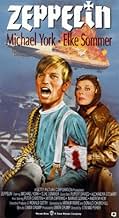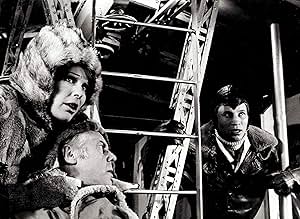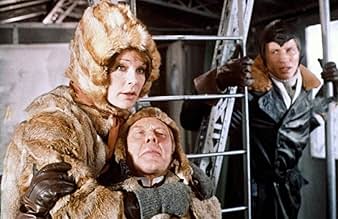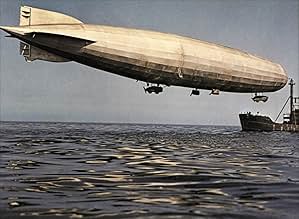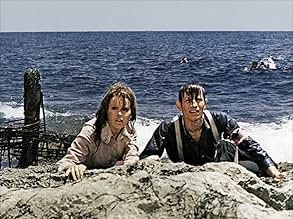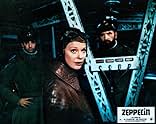Aggiungi una trama nella tua linguaIn 1915, frustrated with the German air-raids on London, British Intelligence sends Scots officer Geoffrey Richter-Douglas, who has German ancestry, to Germany, to find information about the... Leggi tuttoIn 1915, frustrated with the German air-raids on London, British Intelligence sends Scots officer Geoffrey Richter-Douglas, who has German ancestry, to Germany, to find information about the latest German Zeppelin.In 1915, frustrated with the German air-raids on London, British Intelligence sends Scots officer Geoffrey Richter-Douglas, who has German ancestry, to Germany, to find information about the latest German Zeppelin.
- Regia
- Sceneggiatura
- Star
Recensioni in evidenza
Since the general public's reaction to a philo-German film was unknown it was thought that any overt militarism (such as the "Blue Max") should be down because the subject matter of Zeppelins without swastikas (i.e., The Hindenburg) was an unknown commodity thus a safe course was taken and downed played and thus weakening the film. Originally, scenes of epic battles waging beneath the skies of blue were considered and deleted.
In a story meeting Bob Wise's underplay of German militarism in "The Sound of Music" was argued as the public's desire to see Germania topics -- as fodder for story antagaonists without their significance.
It remains at least to me an attempt to discuss loyalty, love's betrayal and history on a very very limited budget.
I remember researching it with dad. What interested Getty was that his father's oil company furnished Germany's airships during the First World War. His contribution despite his then titanic sums available to him for a variety of reasons was very modest. Rumor had it J. Paul called Jack Warner and was concerned that his son was investing in movies and what could he expect... Ronald should however be commended because without his involvement no film on zeppelin would have been made at all (of the very limited collection of zeppelin films thus far).
The film could have used an injection of drama that was unfortunately out of vogue during the time of its production. This sounds like an excuss but one must remember it took "Patton" ten years to be produced out of similiar concerns. It was private money after all...
To dad... thanks for the memory ol' fella will miss ya...
The film gets a magnificent creation of suspense , thriller and emotional drama including some exciting and well staged aerial images . A first rate cast with a valiant and sympathetic lieutenant well reincarnated by Michael York ( Three Musketeers , Cabaret ), a gorgeous beauty as Elke Sommer ( The prize ), her scientist husband old man ( Marius Goring of Red slippers) , Andrew Keir ( Quatermass and the Pit ) and of course the two top-notch devious villains as Anton Diffring and Peter Carsten , both of whom are usual in Nazi roles . Splendid aerial photography with impressive outdoors and sensational sky-shots by cameraman Alan Hume and good matte cinematography , besides fantastic maquettes of ingenious flying machine . Exceptional and atmospheric musical score by musician Roy Budd with extraordinary leitmotif as when the Zeppelin takes off from hangar . The picture is correctly directed by Etienne Perier . It's an acceptable picture and well produced with high budget and shot in Pinewood studies . Rating : Good , better than average .
As far as the commando mission, it is an interesting idea, although the idea of a commando assault in the days before automatic weapons comes across as a bit absurd. Watching the German raiders trying to swing their rifles (with bayonets affixed, no less!) in enclosed spaces is a bit much. It is not impossible that a zeppelin could carry a raiding party. In the first place, it is only a squad that is taken aboard, not a battalion. Secondly, the zeppelin is not carrying a bomb load. Thirdly, the squad is taken aboard near Norway, and is not carried over the entire voyage; only after fuel has been used up. The logistics are sound; the motive for the attack may need some analysis.
The idea that the British would give up, due to the destruction of the Magna Carta and the crown jewels is a bit absurd. However, the thought that German soldiers could strike on British soil, and destroy national treasures, would be a great blow to British morale. World War I was not a very popular war in many circles in Britain. The stalemate in the trenches and the bombing raids on Britain had many people feeling that the war was a waste. A raid such of this would have at least caused the British to pull back some of their resources to defend their home, thereby weakening the front. It's an interesting possibility.
All-in-all, this is an entertaining film with fine performances. The flying sequences are quite well done. The plot is intriguing, if not wholly satisfying. Well worth a look.
Recently having purchased a video tape of the movie, I noticed something that has raised questions in my mind. In the movie, it is stated more times how critical weight is on a Zeppelin. For instance, when Richter-Douglas is first brought on board, Frau Altschul says "weight is critical on an airship--we haven't allowed for this man!" However, later when the Zeppelin has docked on the ship in the North Sea, a score or more of the men who are the "commandos" board the ship, and nothing is said about extra weight.
The only thing I can surmise is that the men who were to actually perform the commando raid in Scotland replaced the regular Zeppelin crew; who consequently disembarked and were left on the naval ship. If this happened in the movie or was mentioned, did I miss it?
Lo sapevi?
- QuizThe LZ36 of history first flew on 8 March 1915 and was operated by the German navy (not the army) as 'L9'. The ship carried out 74 reconnaissance missions in the North Sea, four air-raids on England dropping 5683kg of bombs, and several attacks on British submarines. It caught fire and was destroyed in its shed at Fuhlsbuttel on 16 September 1916 together with L6.
- BlooperOne primary goal of the mission is to destroy "the" Magna Carta, thus demoralizing the British people. However, unlike the U.S. Constitution, the Magna Carta is not a single document but a series of nearly identical charters issued by royal seal. There were 11 "originals," each considered equally original, issued in 1215, of which 4 still survive. There were additional "exemplifications" issued under royal seal throughout the 13th Century, of which 20 more also survive. The destruction of a single version would, therefore, fail to accomplish the German mission of destroying the document.
- Citazioni
Geoffrey von Richter-Douglas: Where are the parachutes?
Frau Dr. Ericka Altschul: What parachutes?
Geoffrey von Richter-Douglas: Well, for emergencies. How do you get out of here quickly?
Von Gorian: Jump!
- ConnessioniReferenced in The Magnificent Seven Deadly Sins (1971)
I più visti
- How long is Zeppelin?Powered by Alexa
Dettagli
- Data di uscita
- Paese di origine
- Lingua
- Celebre anche come
- Zeppelin - Das fliegende Schiff
- Luoghi delle riprese
- Azienda produttrice
- Vedi altri crediti dell’azienda su IMDbPro
- Tempo di esecuzione1 ora 40 minuti
- Mix di suoni
- Proporzioni
- 2.35 : 1


